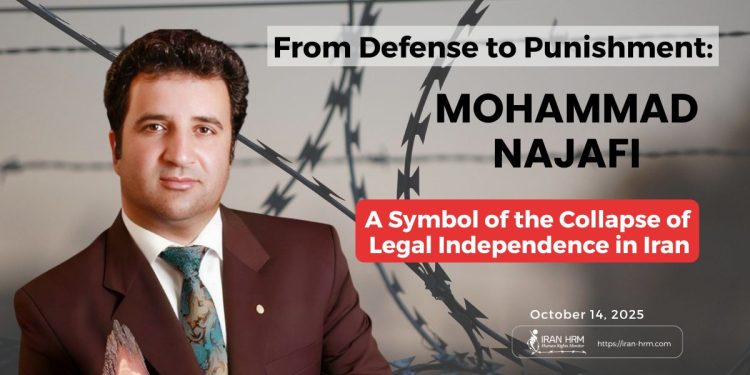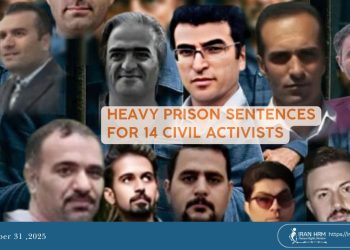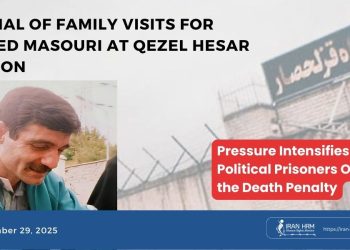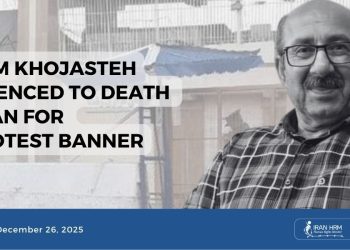New Judicial Case: October 2025 Interrogation
On October 6, 2025, while still serving his prison sentence in Evin Prison, Mohammad Najafi, a human rights lawyer, faced a new interrogation session held in absentia at Branch 3 of the Prosecutor’s Office of District 33 (Shahid Moghaddas) in Tehran.
In this latest case, he has been charged with “propaganda against the regime,” “spreading falsehoods,” and “insulting the Supreme Leader.”
A bail of 1.1 billion tomans was issued in his absence. This is the sixth judicial case opened against Najafi during his imprisonment—further evidence that even incarceration has not shielded him from continued judicial harassment.
Najafi, who suffers from severe diabetes, heart complications, and spinal disc injury, remains deprived of medical care and continues to face new prosecutions.
In a letter from prison, he wrote:
“I stood on the side of the people; my crime is defending the protesters and the families of the slain.”
These words encapsulate his journey—from defense to punishment.
The Beginning: A Lawyer Who Spoke the Truth
Born in 1975 in Shazand, Central Province, Mohammad Najafi was among the first lawyers to courageously defend protesters after the nationwide demonstrations of December 2017.
Following his investigation into the suspicious death of Vahid Heydari at Police Station No. 12 in Arak, Najafi was arrested.
While authorities claimed Heydari’s death was a “suicide,” Najafi documented testimonies proving he died under torture.
That act of truth-telling marked the start of relentless persecution.
Over the past seven years, Najafi has faced six separate prosecutions with 14 charges, amounting to over 21 years of imprisonment, 74 lashes, and fines.
Every time a sentence approached completion, a new case was filed against him—an unmistakable pattern of silencing independent lawyers.
Permanent Disbarment: Silencing the Voice of Justice
The final blow to Najafi’s professional life came on December 22, 2024, when the High Disciplinary Court for Judges issued a ruling for his permanent disbarment.
This process began in March 2020 with a politically motivated complaint.
In January 2024, the Central Bar Association’s Disciplinary Court ruled to discontinue the proceedings, but the then–Prosecutor General of the Bar appealed, and the case was transferred to the High Disciplinary Court—a body without jurisdiction over lawyers.
From prison, Najafi wrote:
“In the slaughterhouse of justice, the heads of the Central Bar Association acted as willing accomplices; the disciplinary hearing was unlawfully held at the Revolutionary Court in Arak.”
This statement captures the depth of a structural tragedy: the very institution meant to protect lawyers has turned into an arm of repression.
The Collapsed Fortress of the Legal Profession
In another letter, Najafi described the Iranian Bar Association as:
“The Bar Association of Iran—like Iran itself—a noble name and a ruined fortress.”
This metaphor precisely depicts the crisis of justice in Iran.
The independence of the legal profession, one of the pillars of justice, has collapsed.
In recent years, many independent lawyers have been imprisoned or suspended.
Yet Najafi’s continued defiance and his letters from prison have made him a symbol of legal resistance.
He wrote:
“The regime tolerates no independent individual or institution—not judges, not lawyers. The independence of both is essential to justice, and I stand with the people.”
Imprisoned Conscience: Suffering and Resistance in Evin Prison
Currently held in Ward 4 of Evin Prison, Najafi’s health has gravely deteriorated.
He suffers from diabetes, high blood pressure, heart disease, and vision loss.
In June 2025, his doctor warned that he would lose his sight without monthly eye injections. Prison officials have refused to transfer him to a hospital.
In November 2024, he fainted en route to a family visit and was taken to a hospital, only to be returned to prison before completing treatment.
According to a source close to his family, “Despite physical weakness, Mohammad keeps writing. He says his pen is his only weapon for justice.”
He wrote:
“I do not bargain for a piece of bread; my father never taught me to eat at any cost.”
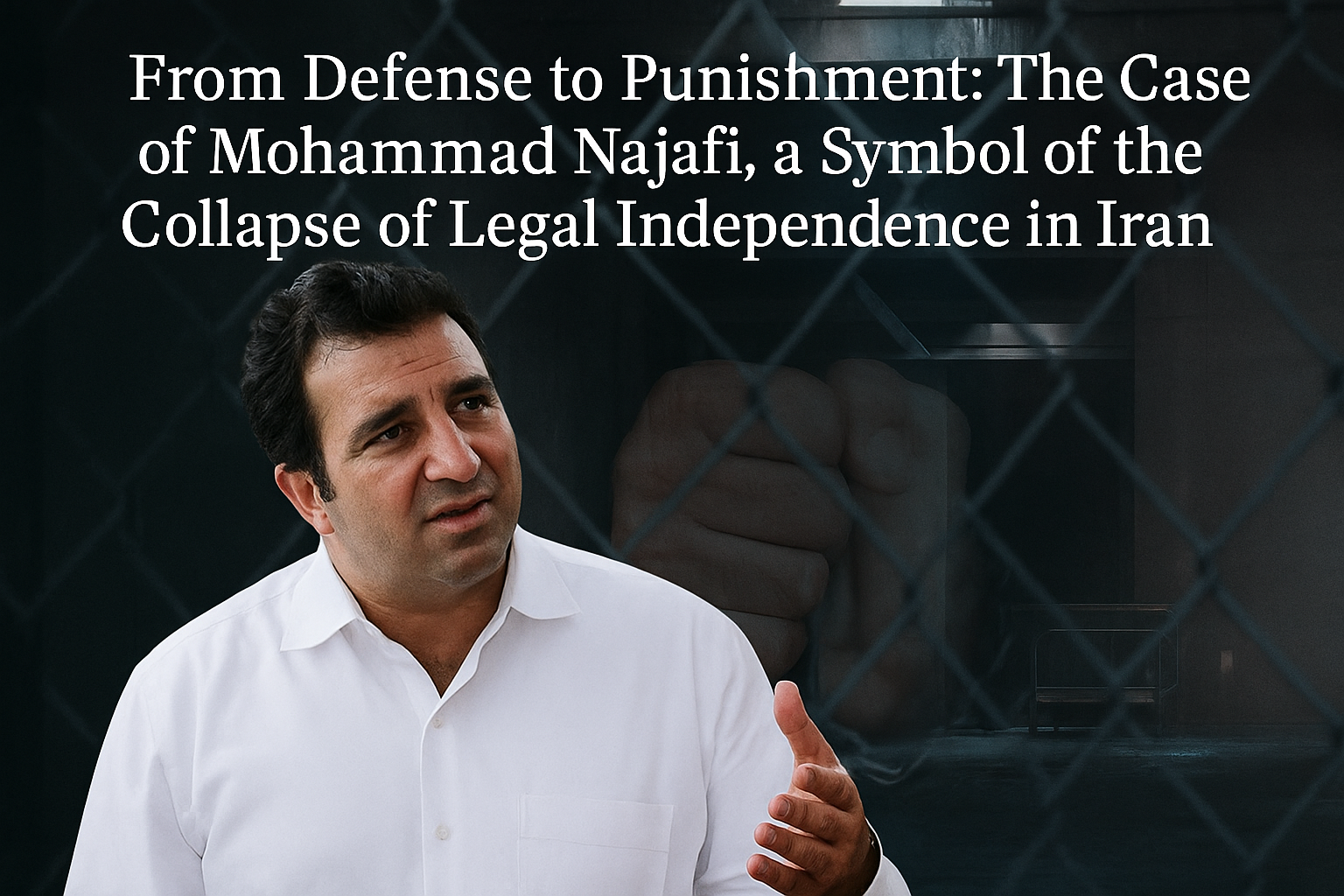 Justice in a Cage: Legal Analysis
Justice in a Cage: Legal Analysis
Mohammad Najafi’s case illustrates systematic violations of international human rights law.
Under Iran’s obligations:
– Article 9, ICCPR: Prohibition of arbitrary detention
– Article 10: Humane treatment of prisoners
– Article 14: Right to a fair trial and to an independent lawyer
– Article 19, UDHR: Freedom of expression and opinion
His repeated prosecutions and disbarment clearly violate these provisions, demonstrating how the legal system criminalizes the defense of justice itself.
International Reactions: A Global Voice for a Silenced Lawyer
Mohammad Najafi’s persecution has drawn international attention.
Organizations including Lawyers for Lawyers, the International Bar Association’s Human Rights Institute (IBAHRI), and Front Line Defenders have called on Iran to end the judicial harassment and restore his right to practice law.
A United Nations statement, issued by the Office of the High Commissioner for Human Rights on 29 January 2024, titled “UN experts urge Iran to respect and protect lawyers,” reads:
“We are deeply concerned by the arbitrary arrest, detention and prosecution of lawyers in Iran. Lawyers play an essential role in protecting the rule of law and ensuring fair trials, yet many of them are imprisoned or disbarred for doing their job.”
Among the signatories were Professor Javaid Rehman, Former UN Special Reporter on the situation of human rights in Iran, and Margaret Satterthwaite, UN Special Reporter on the independence of judges and lawyers.
His Voice from Prison
From Evin Prison, Najafi wrote in August 2025:
“Peace instead of insult, compassion instead of the lash, flowers instead of bullets.”
These are not mere verses but a moral declaration—a reminder that even behind bars, the human spirit can speak for justice.
Mohammad Najafi’s story is the story of two justices: the justice of power, which punishes defenders of law, and the justice of conscience, which endures behind prison walls.
His permanent disbarment is not just the silencing of one lawyer—it is the suppression of a professional conscience standing against tyranny.
“I do not burn for my license; I burn for the love of my people.”
Call for Immediate Action
The international community, human rights organizations, and bar associations worldwide must unite to demand the immediate and unconditional release of Mohammad Najafi and the protection of legal independence in Iran.
His continued imprisonment and disbarment constitute a grave violation of human rights and a warning to all lawyers who believe in justice.
Defending Mohammad Najafi means defending justice itself.

